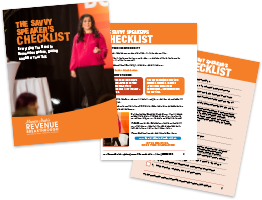Two Common Planning Mistakes
Do you know what the most common planning mistakes are? This week, I want to talk about planning in general and two that keep so many entrepreneurs from making the most of their plans.
I like to say that planning is the highest form of self-care. But too often, people make a plan and then don’t use it, or they ditch the plan as soon as things start to go haywire.
But there are ways to avoid falling off the wagon. Let’s get into those two common mistakes.
Mistake number one: you make a rigid plan at the beginning of the year and expect it to hold up throughout all 12 months.
Let’s say you made a plan in January and held your first group program in March. You wanted to have 10 people in the group, but only one person signed up.
It felt hugely disappointing, and you ended up scrapping your plan altogether. Instead of taking the time to reevaluate the logistics, you spent the rest of that month smoothing your ruffled feathers and trying to convince yourself that everything would be fine.
Now it’s August, and maybe there’s a little bit of panic. There’s overwhelm. There’s confusion. There’s wondering if we’ve done something wrong because we’re not quite where we planned to be.
But here’s the thing: plans are projections. They are not guarantees that anything is going to happen. So it’s incredibly important that you alter your plan and stay open to continuing to change it.
I’ve been in business for over 15 years now, and there has not been a single year when every event worked for us.
But we bounce back.
We go over our numbers before the next event or during the next launch, recover our lost ground, and hit our goals at the end of the year – because we don’t give up on the plan.
Which leads us to mistake number two: you abandon your plan because you forget to check it every day, every week, and every month. This can manifest in a few different ways.
If you’re not looking over your plan every week or month, it’s going to be really difficult to give yourself enough time to do your best on every event or project.
Let’s say you threw an event on August 23, and you didn’t get around to marketing it until August 10 – which means you gave yourself 13 days to market it. Not enough people came, and you blamed yourself for not marketing it soon enough.
You self-sabotage, you fall behind, and then you freak out and beat yourself up.
At the end of the day, I would much rather be able to tell myself that I gave 110% and the event still didn’t work out – which means the universe wanted something different for me.
I’d much rather arm myself with my best plan and my best efforts than self-sabotage, because at least then I’ll know that I did everything I could. Like I said before, plans are projections.
Alternatively, maybe you make a yearly plan and refer back to it every month, but you don’t look at your plan every day, so you end up wasting precious time, energy, and money on initiatives that don’t align with your goals.
That’s why I recommend that you break your plan all the way down into 90-day goals that you can accomplish each quarter, and that you write your 90-day goals down every single day. I even created our Breakthrough Planner to help you keep track of them.
Every single workday, ask yourself: how am I going to hit my 90-day goals? How am I going to hit my annual goals?
Your plan will help get you there, but only if you let it. Only if you cultivate it. Only if you amend it. If you return to it every day, week, and month.
If you’re interested in utilizing my Breakthrough Planner to keep track of your daily, weekly, monthly, quarterly, and yearly goals and plans, I invite you to join us live at our next Breakthrough Planner Day on September 14.
On Planner Days, we come together virtually to walk through how to make the most out of the Planner and plan our next 90 days.
I hope that those two common mistakes help you plan more effectively and understand why planning is the highest form of self-care.
For more on this topic and so many more – jump into our FB Group!








